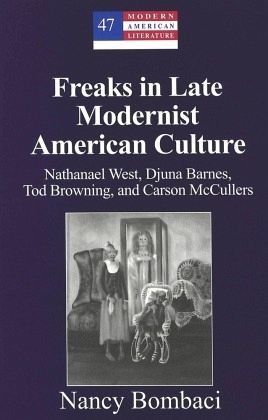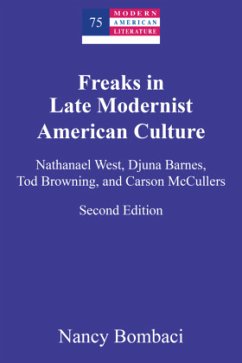
Freaks in Late Modernist American Culture
Nathanael West, Djuna Barnes, Tod Browning, and Carson McCullers
Versandkostenfrei!
Versandfertig in 6-10 Tagen
85,90 €
inkl. MwSt.
Weitere Ausgaben:

PAYBACK Punkte
0 °P sammeln!
Freaks in Late Modernist American Culture explores the emergence of what Nancy Bombaci terms «late modernist freakish aesthetics» - a creative fusion of «high» and «low» themes and forms in relation to distorted bodies. Literary and cinematic texts about «freaks» by Nathanael West, Djuna Barnes, Tod Browning, and Carson McCullers subvert and reinvent modern progress narratives in order to challenge high modernist literary and social ideologies. These works are marked by an acceptance of the disteleology, anarchy, and degeneration that racist discourses of the late nineteenth and early ...
Freaks in Late Modernist American Culture explores the emergence of what Nancy Bombaci terms «late modernist freakish aesthetics» - a creative fusion of «high» and «low» themes and forms in relation to distorted bodies. Literary and cinematic texts about «freaks» by Nathanael West, Djuna Barnes, Tod Browning, and Carson McCullers subvert and reinvent modern progress narratives in order to challenge high modernist literary and social ideologies. These works are marked by an acceptance of the disteleology, anarchy, and degeneration that racist discourses of the late nineteenth and early twentieth centuries associated with racial and ethnic outsiders, particularly Jews. In a period of American culture beset with increasing pressures for social and political conformity and with the threat of fascism from Europe, these late modernist narratives about «freaks» defy oppressive norms and values as they search for an anarchic and transformational creativity.













